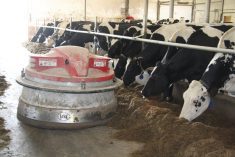The Canadian Cattlemen’s Association plans to be more active south of the border.
CCA vice-president Hugh Lynch-Staunton told the Saskatchewan Stock Growers Association semi-annual meeting that the closed U.S. border following the discovery of BSE in Canada in 2003 prompted the national organization to step up its activity in the United States.
He said the closure forced the organization to stand back and redefine its role in the industry.
“We think we need to have more work done in the United States.”
If it hadn’t been for the work of the National Cattlemen’s Beef Association in the U.S., the border might still be closed, he added.
Read Also

Manitoba extends Crown land rent freeze
Manitoba government links the continued rental rate freeze on grazing and forage leases to economic and environmental challenges facing the industry
One-quarter of the beef eaten in the world is consumed in the U.S.
The second largest market is Europe, to which Canadians have no practical access.
“Any way you cut it … the American market is the biggest thing that we need in this industry,” Lynch-Staunton said.
“It’s the place where we have the competitive advantage going in there.”
He said Canadians need to be smarter about American politics and with American bureaucrats.
“The only market security we have down there is to convince the majority of American cattle producers that our presence there is in their best interests.”
Doing that would be easier without the import regulations requiring American cattle to be tested for bluetongue and anaplasmosis, he added.
Lynch-Staunton also said Canadians need to be more involved in setting international animal health standards.















